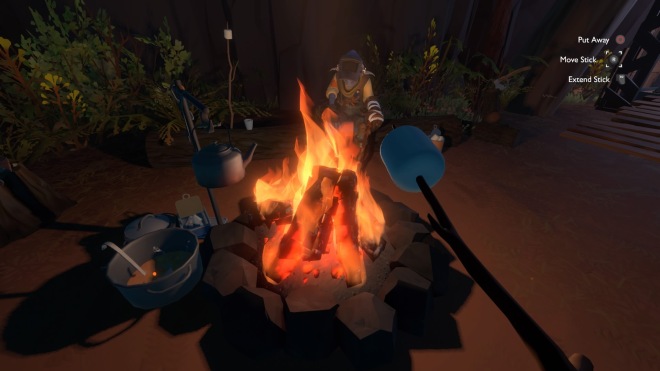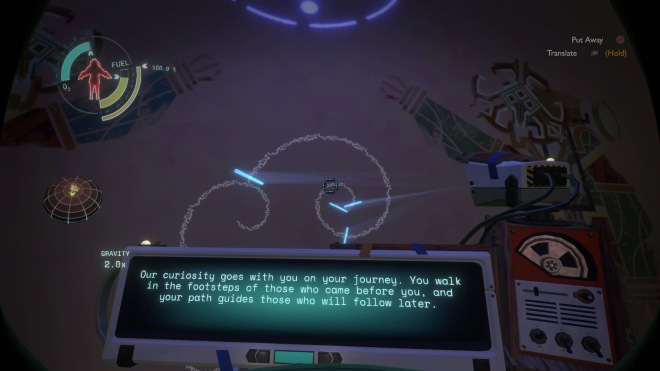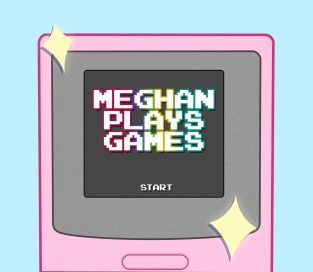Outer Wilds (2019)
Mobius | Reviewed on PS4
Intergalactic investigation at its finest
The indie title, Outer Wilds, despite its planetary exploration, quantum anomalies, and repeating solar supernovas, manages to tell a surprisingly grounded story. Being able to foil the spiraling story of an ancient, alien civilization with one that sees you sitting around a campfire with your friends is no easy feat, and yet, this title does so in a genuinely heartfelt fashion. Outer Wilds involves a Groundhog Day-style timeloop, 22 minutes long, that inevitably ends in the sun going supernova, and destroying the universe and all who inhabit it. It’s up to you to pick up the trail of the Nomai (a precursor race) on a handful of neighbouring planets, and unravel their secrets; you’ll have to uncover the nature of the never-ending loop, and find out if there is a way to change the fate of your own people. It’s heavy stuff – nothing to do with gravity – but you might want to take a breather, and roast a marshmallow or two along the way.

You start on the planet of Timber Hearth, in a quaint, forested village inhabited by the four-eyed Hearthians. This area has multiple tutorial options, from teaching you the basics of zero-gravity travel with your jetpack, to a quick rundown of the dangers of ghost matter. Once you’ve visited the observatory – which offers a quick snapshot of many of the creatures and curiosities that you’ll encounter during your travels – and obtained your launch codes, you’re free to explore the galaxy at your leisure. This title follows in the footsteps of puzzle games like Myst, offering no a linear pathways, or explanation of what the game requires of you. It’s completely up to you where and when you choose to explore – which can be both refreshing, and perplexing. While all of your discoveries will be permanently stored in your ship’s log for you to review when you choose, there is no way of knowing when (or if) you’ve discovered all a planet has to offer. Exploration is truly the core of this title, and you’ll get out of it what you put into it. Because the heart of both the gameplay and the narrative lie in this intergalactic sleuthing, Outer Wilds requires you to be patient and thorough.

Exploring the varying landscapes of the planets in this game was absolutely wild – the dangers lurking in Dark Bramble, and the volatile environment of Giant’s Deep had me constantly on edge, and very much in awe. I died. A lot. But the constant promise of new discoveries, and getting just a little bit father than I had the last time had me dutifully punching in those launch codes, and resuming my search after every mishap. Each new piece of Nomai text, building left unsearched, and unidentified signal to follow drove me forward. The endless time loop always felt too fast; just as I had dug into exploring a new area, or found a revelatory piece of information, the strangely somber, peaceful musical track that signalled the beginning of the supernova would kick in. I would constantly be telling myself: just one more go; just one more sweep of this area before moving on. And then I would find something else. And repeat. I spent hours faithfully combing each area, and I don’t doubt that I still managed to miss a lot.

Finding the messages left behind by the Nomai were a key element to keeping this story of galactic proportions grounded and relatable. Though in many ways, the Nomai feel as far away and foreign to the Hearthians, as say, the people of the medieval ages do to us, translating their texts and exploring their settlements created a unique sense of connection to their ancient civilization. In the same way that learning monks used to doodle in the margins of hand-copied manuscripts, learning about the Nomai, and reading their personal messages made them feel much closer. It’s a brilliant way that Outer Wilds gets its audience invested in characters that we will never meet or know. One in particular, left behind by a student questioning their ability to live up to their mentor, and missing them terribly, really struck me. These intensely human moments, between dodging satellites, and launching scout probes, made the story of this title something truly unique. It’s a narrative that works on both a grand and small scale, a feat that is not easy to pull off. As this review is spoiler free, I won’t get into its intricacies, but it’s a story worth experiencing. Indie gems are often known for their storytelling, and Outer Wilds is no exception.

It’s also going to be worth your while to seek out your fellow intergalactic travellers, once you’re cruising your way around the solar system. They’ll give you advice, and swap information which will come in handy as you try to piece the narrative together. Each one of the Hearthians that have set out before you play a unique instrument, and you’ll be able to locate them on each of the planets by following your Signalscope, attuned to their sounds. I loved seeking out these travellers (Riebeck on the banjo being my favourite) simply because it was nice to know that in the vast, soul-sucking blackness of space, you weren’t alone. I also appreciated the nod to the universality of music – it is, after all, a constant that has bound humanity through the ages. The music in Outer Wilds was actually one of its strongest aspects, as the somewhat understated tracks, while sporadic, were impactful when they did appear.
Despite the engaging way that Outer Wilds presents its exploration, and effortlessly encourages the player to keep seeking, to keep finding, I often found the controls holding me back from wholly enjoying the experience. Both the ship controls, and the jetpack (which serves as your main mode of transportation while on-surface) are unwieldy to handle. While my time with the game eventually made me better at piloting both of them, I still found them to be frustratingly fiddly, even after hours of play. Some of the platforming sections, and in particular, a certain area of Brittle Hollow that required some precise navigation, felt nearly impossible. I was sucked into the black hole, and spat out at White Hole Station more times than I care to admit. It was frustrating to have to repeat the same process, 3, 4, even 5 times simply to reach a certain area after making a mistake. Instead of feeling rewarded by the end, I was only feeling relived at the prospect of never having to repeat that particular sequence again. In some ways, while novel, the 22-minute repeating cycle of gameplay undermines the thrill of exploration. The inevitable annoyance of playing through the same areas, or dying 3 minutes into a loop, and having to restart again, really pulled me out of the experience. I also found the save system to be annoying initially, as you’re unable to save manually, and the game only does so at the end of the time loop. It’s best to have an hour or two carved out to enjoy this title, as it’s not easy to make significant progress in small chunks. The game does, however, save when you die (as you’re forced to restart the time loop) so if you’re looking to quit before your time is up, you can always just yeet yourself into the sun and call it a day. Or, you can use Gabbro’s meditation method, which automatically takes you to the next loop, but that’s not nearly as fun.

Though occasionally frustrating, Outer Wilds presents a unique experience to explore a world with few limitations. If you’ve the patience to persevere through the cycles of trial and error that its structure demands, it’s rewarding in a way that few other games are. Because its story is so ambiguous, it’s the main driving force behind the game’s exploration. While initially feeling like a collection of dissonant pieces, its satisfying to see them all come together to form the bigger picture as you follow the trail of intergalactic breadcrumbs. Its narrative draws attention to the threads that unite us – whether it’s unbridled ambition, or the innate joys of playing music – and remains heartfelt throughout. It’s equal parts hope and melancholy, where the death of a civilization comes with the promise that life begins again. In many ways, Outer Wilds is about eventualities, or inevitabilities, but between these hyper important narrative beats, there also exists a simple expression about the joy of being alive. It’s in the thrill of discovery, the kinships that transcend time and space, and most importantly, the insatiable curiosity that drives us to look outward, beyond ourselves.



“you can always yeet yourself into the sun and call it a day.”
I’ll remember that the next time I’m unmotivated at work 🙂
LikeLiked by 1 person
Words to live by. I’ve definitely wished that that was a viable option on more than one occasion haha.
LikeLiked by 1 person
Yay, glad to hear you enjoyed it!!! I loved the exploration + music aspect of it so much. But yeah, the controls were kind of a nightmare in the beginning. I was playing on PC with keyboard/mouse, and I’ve wondered if a controller would have been better.
LikeLiked by 1 person
The music was definitely an unexpected highlight for me! The controls took me forever to get used to – even after hours with the game, I was still crash landing on planets constantly and over-shooting my jumps…
LikeLike
Thanks for your review! I might keep my eyes open for this one 😊
LikeLiked by 1 person
It’s definitely worth checking out!
LikeLike
Having finally played Outer Wilds, I came back to refresh myself on what you’d thought.
Very interesting to read that you found the individual stories and characters so enjoyable. Owing to my caring less about characters I found the mystery of the time loop and how the individual pieces of solar system fit together more compelling to drive me forward. It’s neat how different players can approach the story differently and choose what their motivation is.
Also laughed finding we both found the controls endless frustrating. I was…reasonably proficient at using them by the end, but holy moly there were some bits where I was shouting at the computer screen because I was so frustrated with them. The Sun Station and Dark Bramble were stand-out moments owing entirely to a longer reset following failure.
Sidebar: I really want to slap whoever is responsible for Dark Bramble. My fear of the deep below has been intensified and validated by this game.
LikeLiked by 1 person
I think in games where I’m on a solitary mission, and finding other characters isn’t necessary, I seek them out more than I would normally. I don’t really know why. In games where the world feels dark/oppressive it makes me feel less freaked out, I guess? But I do like to make a point of trying to get invested in minor characters!
The controls were the one and only thing holding me back from really loving this game. Even after I felt like I’d gotten the hang of stuff, I’d encounter a new section that was completely enraging (i.e. trying to make it to the observatory). I actually had to put the game down and take breaks because I would get so frustrated.
Sidebar: So the first two or three times I went in to Dark Bramble, I was struggling with the controls and going really slow anyway, so I never encountered the giant fish monster. Once I got more comfortable going fast, and returned, I found one almost immediately and I damn near had a heart attack. I had assumed they were all dead up until that point. I was terrified to go back after that, so I feel you!
LikeLiked by 1 person
Somewhat related, would you say that’s a large contributing factor to why you’ve gotten into Dark Souls in such a big way? Finding, interpreting, and enjoying those small stories alongside the over-arching one?
I think the biggest thing with the controls that constantly got me was when you’d keep floating while trying to read text. Like…why?! Why do I have to manually stop myself from floating off while I’m reading. Clearly I want to stop and read. HARUMPH!
I could only get through that one room with the three of them by muting the game, closing my eyes, and waiting for my GF (who was watching me play) to tell me when I drifted near the egg clutch so I could course correct for the next warp seed. That broke me. I want to yeet that whole planet into the sun.
LikeLiked by 1 person
Funny you ask that, because I was going to add “like Dark Souls!” to the first part of my comment, but I was like “pretty sure people are tired of you talking about Dark Souls, so let’s not.” I think the bleakness of that world definitely pushed me to be more invested in the NPC’s than maybe I should be; those small, nested narratives are a big reason I like the game so much. It was nice to see that other characters were also struggling through the same world we (as the player) are. When I first played Dark Souls 3 I was obsessive about finding new characters, and making sure I followed their questlines through to the end. I (personally) find it to be a compelling element throughout the series.
The floating/drifting also drove me nuts. It just felt like movement that required any kind of precision was impossible, so when the game needed you to do just that, it was ridiculous. I was quite possibly the worst pilot ever – I crash-landed my ship on probably about 80% of my journeys. There was the one satellite (I think?) or small station floating around that you had to land on a very small area to access, and yeah, that was a challenge, to say the least.
That sounds like a wild strategy! I just went as slow as possible while freaking out the entire time, but yours sounds much more fun! Haha, I’m glad that’s the line that stands out to people in this review… I think it’s a good line. The list of things that deserve to be yeeted into the sun is quite long, honestly.
LikeLiked by 1 person